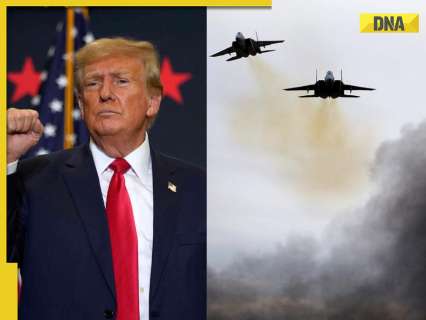Now Reading: After Donald Trump’s airstrikes on Iran, who holds power to declare war in US? Here’s what the Constitution says
-
01
After Donald Trump’s airstrikes on Iran, who holds power to declare war in US? Here’s what the Constitution says
After Donald Trump’s airstrikes on Iran, who holds power to declare war in US? Here’s what the Constitution says

As the United States made a major entry in the Iran-Israel war, fears about US declaring war are heightened. Donald Trump took the decision without informing the Congress. But does he really has the power to take war decisions in his own? Let’s go back to what Constitution says.
Donald Trump struck the three nuclear sites in Iran without informing the Congress which means that he did not get approval for the action from the latter.
On June 22, when Trump announced a series of coordinated airstrikes on Iran’s nuclear facilities — hitting targets in Fordow, Natanz, and Isfahan — he did so without notifying Congress, let alone securing its approval. The sites were hit with precision-guided missiles and 30,000-pound bunker-busters. While Tehran stopped short of a formal declaration of war, officials warned that retaliation was inevitable.
As the United States made a major entry in the Iran-Israel war, who decides how much a president has the authority to make decisions about going to war. The ongoing conflict in the Middle East has been intensified after the US’ entry which dealt a ‘monumental damage’ to Iran’s significant Fordow nuclear site and this was not the end as President Donald Trump urged Iran to “make peace”, warning further retaliation would provoke even harsher US responses. For years the US has continued to involve itself, whether actively or not, in various wars around the world and possesses massive powers to escalate any war with some of the most powerful arsenals.
What US Constitution says about war?
In this context, in 1973, US Congress passed the War Powers Act to restrict presidents from going overboard in any war situation. The decision came as the US was at war with Vietnam for two decades which forced the Congress to take such a decision. Donald Trump’s strike on Iran sparked a debate around the subject.
Donald Trump struck the three nuclear sites in Iran without informing the Congress which means that he did not get approval for the action from the latter. The US Constitution has norms which decide authority in such cases. The Constitution under Article I, Section 8, clearly says that Congress solely has the authority to declare war and not the President. This was deliberately done to check on the executive power and to ensure that such grave decisions are made by the people’s representatives.
However, once the Congress declares a war, the president can take the authority to guide military operations because of his designation of the Commander in Chief under Article II. The president can also to respond swiftly to sudden attacks.
What Trump’s action led to?
The US hit the targets in Iran with precision-guided missiles and 30,000-pound bunker-busters which led to officials in Iran sending out a warning of an inevitable retaliation. Its fury was such that Iran’s ambassador, Amir Saeid Iravani, accused the United States of having “destroyed diplomacy,” at an emergency meeting of the UN Security Council with a warning that its military would decide the “timing, nature, and scale” of its retaliation, reported the Associated Press.
Soon after the attack, Iran’s Foreign Minister Abbas Araghchi reached Moscow for discussions with Russia in a sign that the conflict could escalate beyond the regional boundaries.























